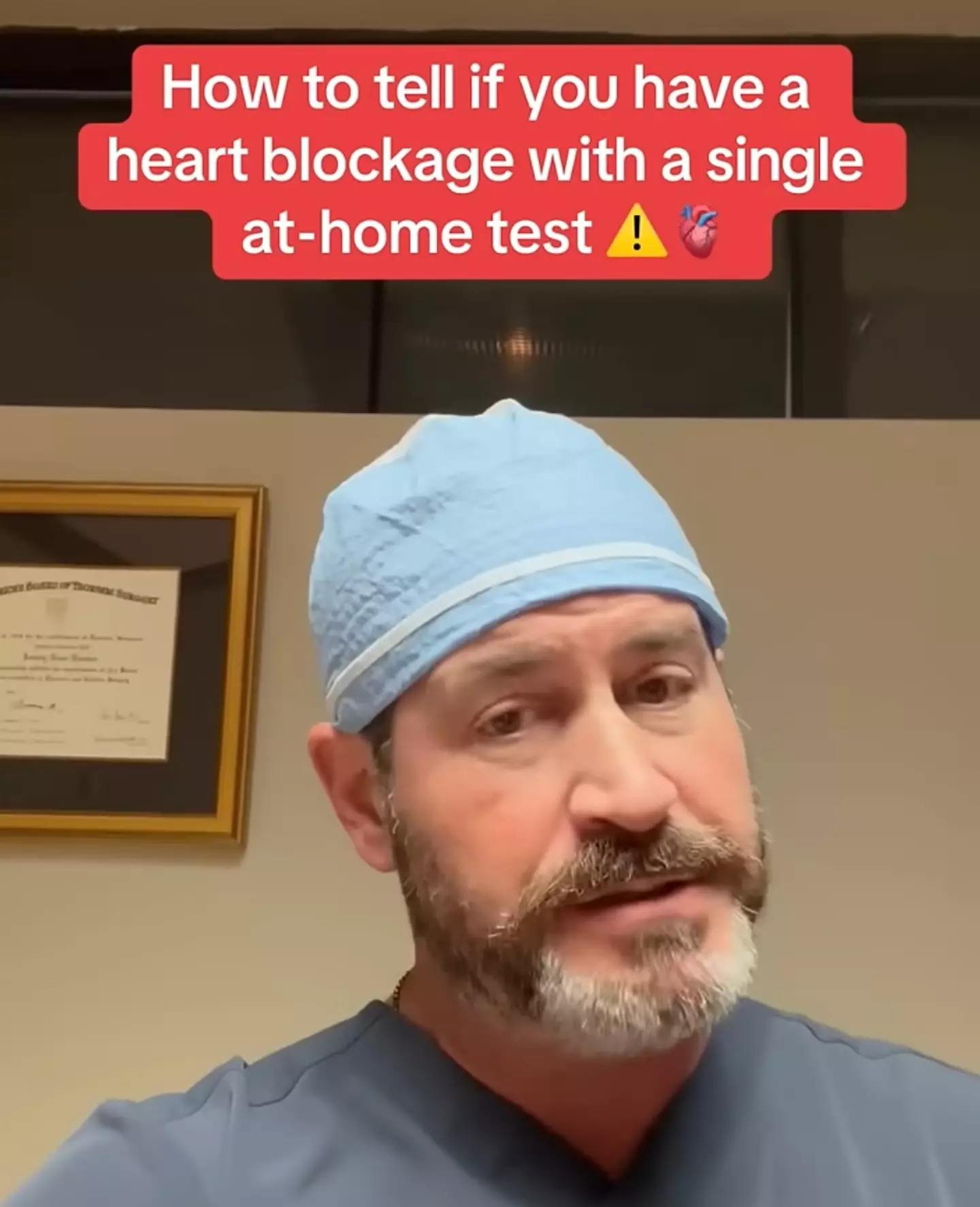A heart surgeon with 25 years of experience has revealed how a simple test can help you determine if something is wrong with your ticker.
Dr Jeremy London explained he has a straightforward method which can allow you to find out whether the major organ is working as it should.
The best part is, you can do it from the comfort of your own home and it should only take a short amount of time - so really, there's no excuse not to give it a go.
Dr London explained you don't always need to faff around having a blood test, X-ray or electrocardiogram (ECG) to get a sense of your heart health.
The expert, from the US, claims his trick can check on the sufficiency of your arteries and indicate whether there might be a blockage.
In a recent video shared to his YouTube channel (@drjeremylondon), he shared the details of his health hack.
He said: "How can you tell that you may have important blockages of the heart arteries without a single blood test, X-ray, or ECG?
"Well, not surprisingly, you have to listen to your body."

Dr London shared his hack for checking up on your heart health at home (YouTube/drjeremylondon)
Listing off some 'red flags' to look out for, Dr London warned that chest tightness, chest pain and shortness of breath, could be a worrying sign.
As well as this, if you are suffering from pain which radiates to the jaw or arm with exertion that is relieved with rest, this might also be a sign that your ticker might be in bad shape.
Dr London then explained why these symptoms might suggest the arteries in your heart might be a bit clogged.
"Let's assume for a minute that you have a blockage in the artery of the front of the heart," he said. "When you exert yourself, that area below the blockage is blood starved and you start to have these symptoms.
"When you rest, the demand on this area of the heart goes down and the pain goes away."
This experience is often associated with angina, which is a usually non-life threatening chest pain caused by reduced blood flow to the heart muscles, according to the NHS.

You might want to check in with your GP if you've been experiencing some discomfort in your chest (Getty Stock Photo)
"But it's a warning sign that you could be at risk of a heart attack or stroke," the NHS explains.
It is also a common symptom of coronary heart disease (CHD), which is caused when your coronary arteries become narrowed by fatty material within their walls.
The British Heart Foundation explains: "Over time, a fatty material called atheroma (sometimes known as plaque) can build up inside your coronary arteries. This process is called atherosclerosis.
"Eventually, your arteries may become so narrow that they cannot get enough blood to your heart."
According to the cardiovascular research charity, a lot of people with blocked arteries or atherosclerosis are unaware of it 'until they develop symptoms, such as angina or claudication'.
Dr London added: "Now clearly, not having this situation doesn't mean that you don't have blockages in the heart arteries, but if they are occurring you need to see a qualified healthcare professional."
Like he said - run through the test and you can then check in with your GP if you've got any concerns.
Dr Jeremy London explained he has a straightforward method which can allow you to find out whether the major organ is working as it should.
The best part is, you can do it from the comfort of your own home and it should only take a short amount of time - so really, there's no excuse not to give it a go.
Dr London explained you don't always need to faff around having a blood test, X-ray or electrocardiogram (ECG) to get a sense of your heart health.
The expert, from the US, claims his trick can check on the sufficiency of your arteries and indicate whether there might be a blockage.
In a recent video shared to his YouTube channel (@drjeremylondon), he shared the details of his health hack.
He said: "How can you tell that you may have important blockages of the heart arteries without a single blood test, X-ray, or ECG?
"Well, not surprisingly, you have to listen to your body."

Dr London shared his hack for checking up on your heart health at home (YouTube/drjeremylondon)
Listing off some 'red flags' to look out for, Dr London warned that chest tightness, chest pain and shortness of breath, could be a worrying sign.
As well as this, if you are suffering from pain which radiates to the jaw or arm with exertion that is relieved with rest, this might also be a sign that your ticker might be in bad shape.
Dr London then explained why these symptoms might suggest the arteries in your heart might be a bit clogged.
"Let's assume for a minute that you have a blockage in the artery of the front of the heart," he said. "When you exert yourself, that area below the blockage is blood starved and you start to have these symptoms.
"When you rest, the demand on this area of the heart goes down and the pain goes away."
This experience is often associated with angina, which is a usually non-life threatening chest pain caused by reduced blood flow to the heart muscles, according to the NHS.

You might want to check in with your GP if you've been experiencing some discomfort in your chest (Getty Stock Photo)
"But it's a warning sign that you could be at risk of a heart attack or stroke," the NHS explains.
It is also a common symptom of coronary heart disease (CHD), which is caused when your coronary arteries become narrowed by fatty material within their walls.
The British Heart Foundation explains: "Over time, a fatty material called atheroma (sometimes known as plaque) can build up inside your coronary arteries. This process is called atherosclerosis.
"Eventually, your arteries may become so narrow that they cannot get enough blood to your heart."
According to the cardiovascular research charity, a lot of people with blocked arteries or atherosclerosis are unaware of it 'until they develop symptoms, such as angina or claudication'.
Dr London added: "Now clearly, not having this situation doesn't mean that you don't have blockages in the heart arteries, but if they are occurring you need to see a qualified healthcare professional."
Like he said - run through the test and you can then check in with your GP if you've got any concerns.


Post a Comment